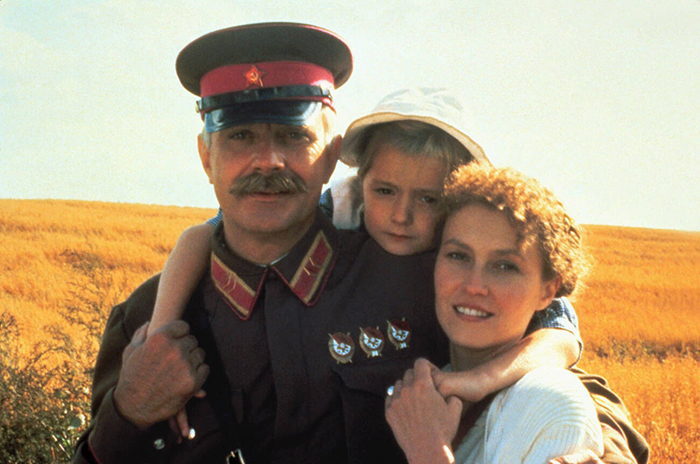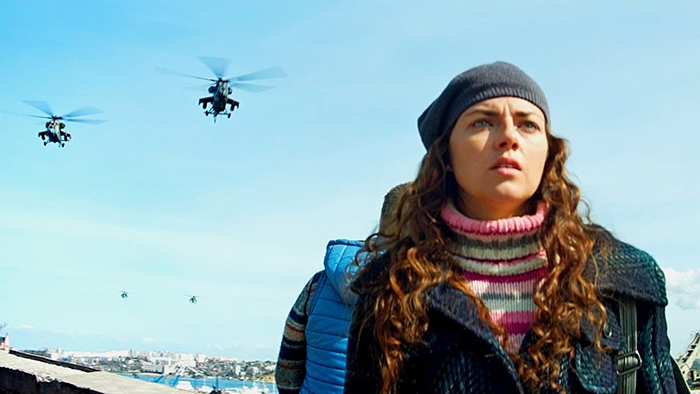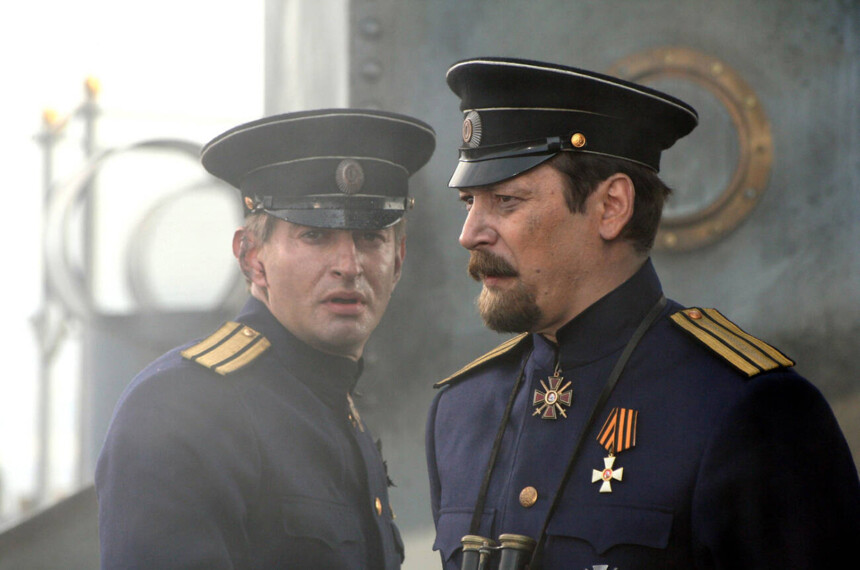Bringing history to the big screen is a contentious matter. To reflect the dominant historical narrative of our time—the “march of progress”—filmmakers must ensure that their script and their casting choices reflect current-year values. Where, then, can viewers turn to find historical cinema that promotes traditional values, not the libertine cosmopolitanism of Hollywood? The closest thing to an alternative comes from a surprising place: Russia.
Most of Russia’s film industry is controlled, at least to some extent, by the state. The government owns several studios outright, and many others receive funding from the Ministry of Culture. But despite these investments, Russia faces unique challenges when attempting to craft compelling historical narratives through film. Unlike other European nations seen as strongholds of traditional values, such as Poland or Hungary, the Russian state cannot easily portray itself as reliably being on the right side of history, especially during the 20th century.
When it comes to the 20th century, nearly all Western nations—cosmopolitan and identitarian alike—rely on the “right side of history” framework. For the denizens of Britain, France, Poland, and many other European countries, your popular history of the last hundred years reads something like this: your nation faced and overcame hostile Germans in World War I, then you faced and overcame even-worse Germans in World War II, then you faced and overcame the Soviet Union.
Russia does not have that luxury. For it, World War I ended not in clear-cut victory or defeat but in a devastating civil war. From that conflict there arose a brutal occupation regime motivated not only by leftist ideology but by a resentment of the Russian people and their Christian faith. Yet, two decades later, that same regime and the people under it mounted a heroic defense of the Russian homeland against an apocalyptic threat in the form of the Third Reich.
An entire generation of Russians became part of an indisputably heroic legacy—yet one that was forged under Soviet red banners. Forty years later, the Soviet regime ran out of steam and fell apart, but the following decade was not one of national renewal. While other former Soviet bloc states reestablished continuity with their pre-Communist history, Russia could not simply erase the preceding 70 years. The Soviet system was inflicted on Russians, but it was also built, protected, and made livable by Russians. It is this legacy that the Russian state must navigate as it tries to forge a unifying narrative through its culture industry.
For decades, Soviet historical film stayed within the safe zone of World War II, telling stories of the heroic Red Army defeating the evil “fascist” invaders. The term “Nazi” was not often used because it could raise uncomfortable questions about how exactly “socialism” was different and better than “national socialism.” But when the state curators and censors began loosening their grip in the 1980s, Russian screenwriters and directors began to expand their scope.
First, there was Elem Klimov’s Come and See (1985), which went against Great Patriot War film conventions by portraying the horrific impact of German occupation on Soviet civilians instead of the usual dramatic battle sequences. Three years later came Eduard Volodarsky’s Moonzund (1988), so named after the Baltic Sea archipelago where Russian naval forces had faced off against a much larger German fleet in late 1917. Set during the October Revolution, the film portrayed Russian officers doing their duty with honor and courage while pushing back against the Bolshevik agitators in their ranks.
Moonzund’s criticism of the Soviet system was necessarily softened: characters take issue not so much with the revolution as with its deleterious effect on military discipline at a critical point in the war. But making Russian officers—not Soviet commissars—the protagonists in a film set during the events of 1917 was a significant step towards reconsidering the legacy of the Russian Civil War.
Following the dissolution of the Soviet Union, more openly anti-Communist films became possible. The Chekist, a joint Russian-French production which portrayed the mass arrests and killings committed during the Red Terror of the early 1920s, received praise at the 1992 Toronto International Film Festival. Two years later, veteran Soviet actor and filmmaker Nikita Mikhalkov released Burnt by the Sun, a condemnation of Stalin’s purges in the 1930s. While the critical response to the film in Russia was initially mixed, it was well received by the public. It also made an impression on critics in the West, winning both the Grand Prix at the 1994 Cannes Film Festival and the Academy Award for Best Foreign Film.

above: Nikita Mikhalkov, his daughter Nadezhda Mikhalkova, and Ingeborga Dapkunaite in Mikhalkov’s 1994 film Burnt by the Sun (Sony Pictures Classics)
Since the 1990s, Mikhalkov has become one of the senior statesmen of the mainstream Russian film world. In some ways, his career parallels the trajectory of Soviet and Russian historical cinema as a whole: it first produced a large number of regime-friendly productions, followed by more nuanced portrayals of the Soviet system in films such as Andrei Konchalovskiy’s 1979 epic Siberiada, and finally explicit revisionism starting in the 1990s. Mikhalkov even managed to check the box of producing too many low-grade World War II movies—something that the Russian film industry still does to this day. (The less sаid about Mikhalkov’s two sequels to Burnt by the Sun, set during the 1940s, the better.)
The 2000s in Russia marked not only a partial recovery from the severe economic recession and societal chaos of the previous decade but the emergence of a more focused ideology within the Russian state. During the 1990s, the corrupt, incompetent Yeltsin government made little effort to articulate a coherent post-Soviet cultural agenda for the beleaguered Russian people. President Vladimir Putin, on the other hand, has attempted to balance the necessity of acknowledging Soviet nostalgia with the need to define Russia as a more conservative, orderly counterpart to an irrational, cosmopolitan West. While it would not be accurate to say that the Russian state has encouraged revisionism of the Russian Civil War, the revival of Russian patriotism starting in the late 2000s no doubt spurred a renewed interest in positive portrayals of the Russian Empire and tragic interpretations of its fall.
In 2008, Andrey Kravchuk’s film Admiral was released in theaters. Unlike the late-Soviet Moonzund, this World War I epic explicitly identifies the anti-Communists—commonly referred to as the “White” Army, in contrast with the Bolshevik Red Army—as the heroes. The film follows the titular admiral, Aleksandr Kolchak, from his service in the Baltic Sea, where his bravery earns him the attention of the czar, to his command of the Russian Black Sea Fleet in 1917, when the revolution occurs, to the Siberian front of the civil war.
The Admiral makes several conspicuous departures from Soviet-era portrayals of the 1910s in Russia. The empire’s successes in the war are highlighted, most notably the dominance of the Russian fleet in the Baltic Sea and the planned invasion of the Ottoman Empire to take Constantinople, both of which fell apart due to the revolution. The characterization of Emperor Nikolai II is another welcome change: while Communist propaganda heaped abuse on the Czar after his murder, labeling him utterly inept and viciously cruel, the film portrays him as a reserved, pious man, but also as a leader intent on securing his nation. The film concludes with an unapologetic defense of the doomed White cause, highlighting the betrayal of the Russian forces by the Western Allies and filling the scene of Admiral Kolchak’s final moments with Orthodox Christian imagery.
The success of Admiral paved the way for further examinations of the Russian Civil War and its aftermath in film. In 2012, the state channel Russia-1 aired “The White Guard” television series, an adaptation of the 1925 book of the same name by the masterful Russian novelist Mikhail Bulgakov. Set in 1918 Kiev, the show follows a family of Russian officers as they navigate the factions vying for control of the city: the White and Red Armies, the German forces remaining in the region, and the nascent Ukrainian nationalists. The show’s unflattering portrayal of the latter led the Ukrainian government to ban it from its own state media.
“White Guard” is a difficult show to watch. It is full of women crying out of hopelessness and men trying to maintain a stiff upper lip in the face of certain defeat. But it is valuable as one of the few media portrayals of the Russian Civil War in Ukraine. In 2014, Nikita Mikhalkov returned with another anti-Bolshevik film, Sunstroke. Inspired by the diaries of Russian writer Ivan Bunin, it follows a White officer in a Crimean Red Army prison camp as he tries to make sense of his own past life and of the destruction of his nation. Sunstroke received mixed to positive reviews, but perhaps the most insightful take came from critic Anastacia Kurganskaya. Though she was not a fan of the film, Kurganskaya observed that modern Russian state cinema “has one decent trait—all of it, with varying success, tries to create a sort of myth around Russia and its heroes.”
“Varying success” is an apt description. Russian studios still produce plenty of middling World War II movies and other unremarkable action flicks. But the state film industry’s new sympathy for the Russian Empire and the White Army shows that the government is making some effort to forge a post-Soviet national identity with conservative elements.

above: Evgeniya Lapova in Aleksey Pimanov ‘s 2017 film Crimea (Pimanov i Partnyory)
Some of the Russian film industry’s most recent productions even attempt to contextualize modern Russian foreign policy. For example, Aleksey Pimanov’s Crimea, released in 2017, tells the story of a young couple caught up in the 2014 Ukrainian revolution and the subsequent reunification of Crimea with Russia. And, in theaters this year, Andrey Batov’s Tourist follows Russian private military contractors in Africa.
It’s doubtful that making gritty action movies where the good guys with guns are Russians will change anyone’s mind in the West. It may, however, serve as effective counterpropaganda against Russia’s small but vocal liberal media. Perhaps most importantly, it may make young Russians proud of their nation and its history. At the very least, the Russian state and its film industry is making an effort to do so, which is more than can be said of most Western countries.
Image Credit:
above: Konstantin Khabenskiy and Vladislav Vetrov in Andrey Kravchuk’s 2008 film Admiral (Film Direction/Dago Productions)
